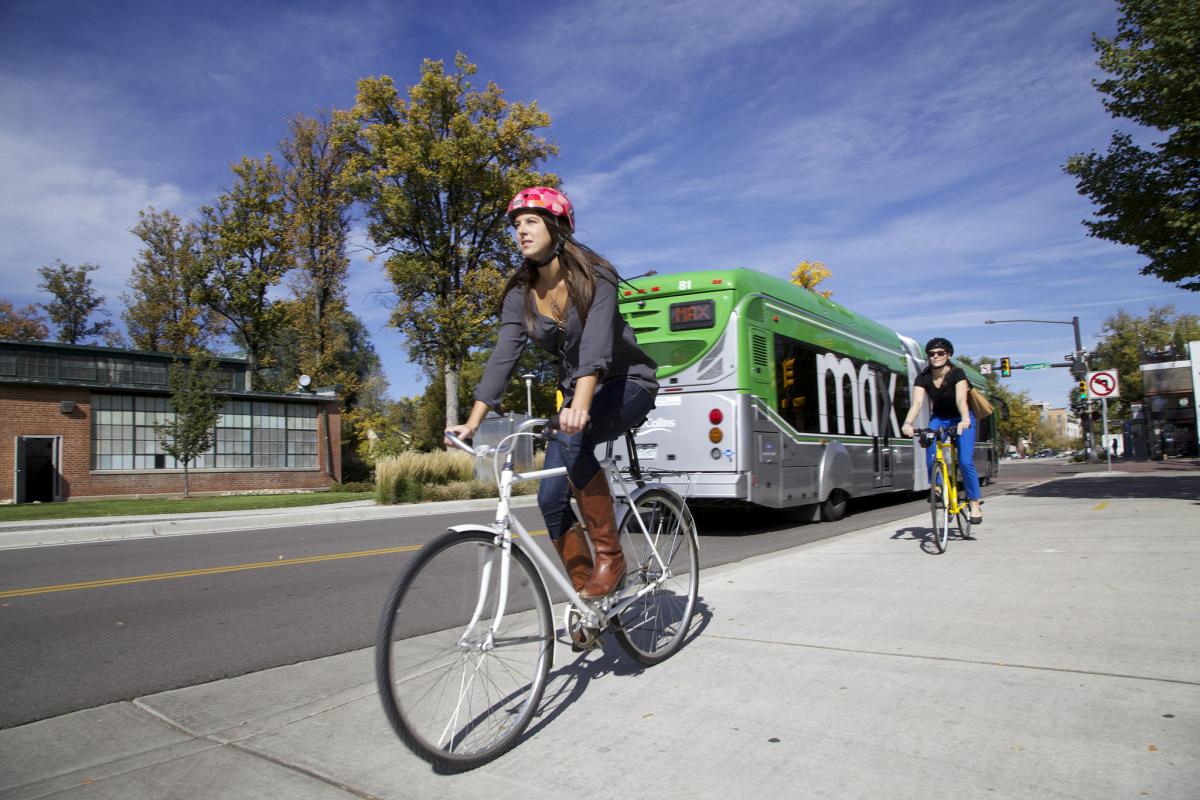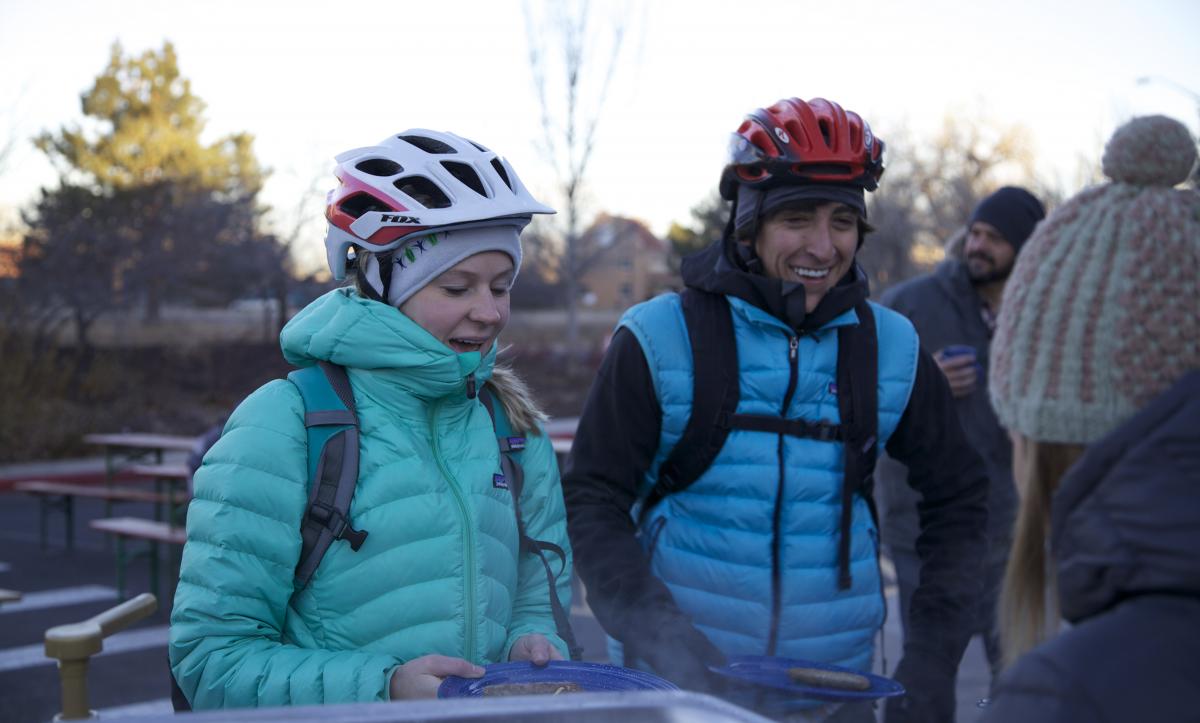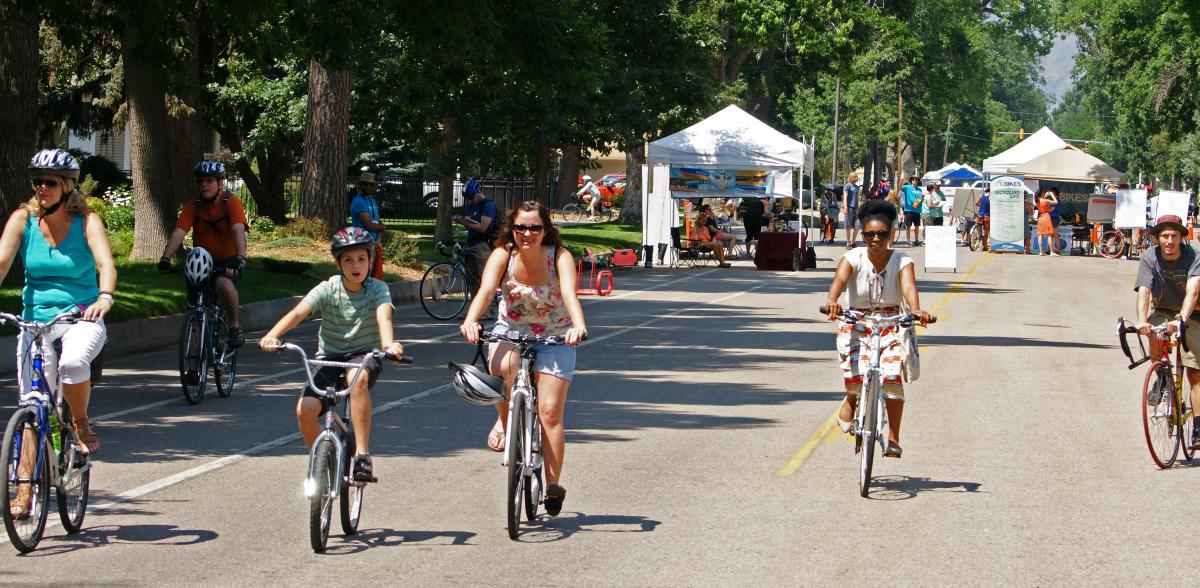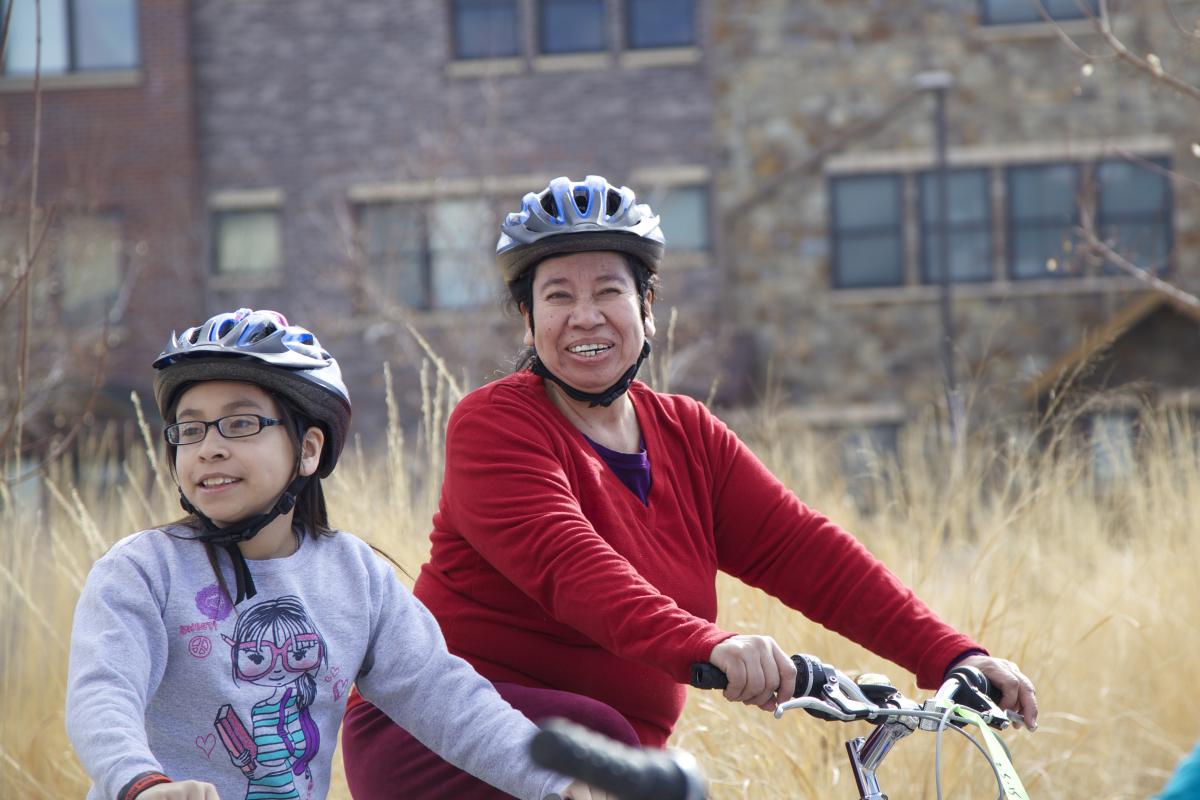DISCOVER YOUR LOCAL BICYCLING COMMUNITY
Find local advocacy groups, bike shops, instructors, clubs, classes and more!
Fort Collins’ 10 Steps to Diamond BFC Status
This article, written by Tessa Greegor, Bike Program Manager for the City of Fort Collins, Colo., originally appeared in the Spring 2015 issue of the League’s American Bicyclist magazine.
Imagine: It’s the year 2020. In Fort Collins, Colorado, one in every five people travels by bike — and there are zero bicycle-related fatalities.
The foundation for achieving this vision, set forth in the city’s 2014 Bicycle Master Plan, is a low-stress bicycling network: a comfortable, safe and connected system of world-class bicycle infrastructure, accessible to all residents and visitors, aged 8 to 80.
In 2020, a bicycle trip along this low-stress network, whether to school, the park, or Old Town Fort Collins, will be seamless and, most importantly, fun.
 Among hundreds of designated Bicycle Friendly Communities in the country, only four – Portland, Davis, Boulder and most recently Fort Collins — have achieved Platinum status. For Fort Collins, the 2013 Platinum designation was a reflection of the strong bicycle culture, leadership and thriving community partnerships, grassroots bicycle advocacy, a bicycle-minded business community, and a growing Fort Collins population choosing to ride along the city’s extensive bikeway system. Two years later, the wheels have been set in motion for an even greater bicycling future, as the community works to achieve a new Diamond-level status, where people of all ages and abilities feel comfortable and confident riding a bike.
Among hundreds of designated Bicycle Friendly Communities in the country, only four – Portland, Davis, Boulder and most recently Fort Collins — have achieved Platinum status. For Fort Collins, the 2013 Platinum designation was a reflection of the strong bicycle culture, leadership and thriving community partnerships, grassroots bicycle advocacy, a bicycle-minded business community, and a growing Fort Collins population choosing to ride along the city’s extensive bikeway system. Two years later, the wheels have been set in motion for an even greater bicycling future, as the community works to achieve a new Diamond-level status, where people of all ages and abilities feel comfortable and confident riding a bike.
How will we get there? Here’s our blueprint for becoming a world-class city for cycling.
2020 low-stress network
The foundation for achieving the city’s bicycling vision and reaching a majority of the population who would like to bike more often given the right environment (the “interested but concerned) is a 162-mile, low-stress bicycle network.
This low-stress network will leverage existing city streets with low traffic volumes and speeds, and existing and planned trail connections to develop cross-city routes that are comfortable for all, including youth and families, seniors and commuters. By 2020, more than 80 percent of Fort Collins’ population will live within one-qarter mile of a low-stress bicycle route, connecting them to schools, transit, areas of employment and other community destinations.

The 2020 network will include protected bike lanes on higher traffic streets, buffered bike lanes and intersection improvements where low-stress streets intersect high-stress arterials. Signal enhancements, two-way sidepaths and other innovative intersection crossing treatments will provide a high comfort experience for people traveling along the low-stress network.
Innovation through design
In 2014, Fort Collins installed its first dedicated bike signal along with green intersection striping to help people on bikes navigate a complex intersection. In 2015, we’ll bring additional innovation with the city’s first greenway project and first protected bike lane, which will be implemented as a pilot project over the course of one year.
Marketing the low-stress system
As Fort Collins continues to develop its low-stress bicycle network, ensuring that people are aware of the optimal cycling routes will be critical. In 2015, the city will lay the foundation for its bicycle wayfinding system, publish a new city bicycle map highlighting “higher comfort” routes, and continue to develop online bicycle route finding tools.
Two-wheeled public transit
Bike Share programs are transforming cities worldwide, increasing the accessibility and convenience of bicycling and expanding the reach of traditional public transit systems. Building on the success of the existing Fort Collins Bike Library (the city’s low-cost bike rental program), the city is working toward an innovative solution to introduce a modern Bike Share program to residents and visitors alike. The city completed a Bike Share Business Plan and is now looking to launch a bike share pilot program that will test the use of “smart bikes”— bikes that will be available in downtown, along the city’s transit lines, and at Colorado State University for the public to make short and convenient trips by bike.
Advancing education and awareness through leading-edge bicycle programs
With ambitious bicycle ridership and safety goals, the 2014 Plan proposes building on existing bicycle programs — such as the city’s Bicycle Ambassador Program and Bike to Work Day initiative — using a collaborative approach that involves community organizations, schools, businesses and city government. With additional educational opportunities, encouragement initiatives and focused enforcement, these programs will complement the bicycle network plan and foster a culture of respect, responsibility and awareness for all transportation system users.

Gender equity in cycling
In Fort Collins, nearly 11% of adult males commute by bike, more than double the percentage of women. The percentage of women bicycling in a community is often used as an indicator of bike friendliness, as studies have shown that women are often more affected by certain barriers to bicycling.
In 2014, Fort Collins launched Women on a Roll, a women-focused bicycle initiative to break down barriers to bicycling among women while seeking gender equity in cycling, a goal of the 2014 Plan. Women on a Roll events included a women’s bicycle expo, women-only bicycle rides, learn-to-ride classes and other educational opportunities.
Streets for people
Designing streets to serve all users has been the underlying principle of the Complete Streets movement.
Responding to the evolution of bikeway infrastructure design and a more holistic understanding of how streets can function to serve all people — commuters, shoppers, or children bicycling — communities around the country are reallocating street spaces to better serve a full range of users. Through Open Streets or car-free streets initiatives, communities can temporarily apply these concepts.
Fort Collins hosted its inaugural Open Streets in 2014. The event was an opportunity for people of all ages and abilities to comfortably experience public streets on foot or bike with the goal of generating interest in future bicycle trip-making, building community, and supporting public health goals. In 2015, we’ll expand this initiative, with two Open Streets events in June and September.

Increasing the reach of education through bicycle ambassadors
The City’s Bicycle Ambassador Program (BAP), launched in 2012, currently has more than 45 volunteer ambassadors. The BAP significantly expands the reach of bicycle education across the region, as ambassadors are on-hand to teach bicycle safety classes, learn-to-ride classes and the League’s Smart Cycling classes.
In 2015, the BAP will add new classes to its repertoire, including an introduction to bicycle touring for youth. A new and exciting element of the BAP will offer opportunities for middle- and high-school students to participate in the program and become ambassadors among their peers.
Inclusive programming
The 2014 Bicycle Plan also established a goal of increasing participation in bicycling and bicycling programs among the city’s Latino population. Bicycle education and outreach programs have been offered in Spanish through a partnership with the city, a regional health organization — Vida Sana — and the community’s local bicycle co-op. Additional neighborhood-level bicycle events are planned for 2015.

Ensuring success through data
The 2014 Plan includes a strong emphasis on evaluation of the city’s programs and projects. Demonstration, or pilot, projects are a fundamental piece of the city’s near-term strategy to evaluate new-to-Fort Collins infrastructure, such as protected bike lanes and programs such as Bike Share. New technology, like automated bicycle counters, will support overall efforts to measure progress over the years while determining the impact of bicycle-related investments. In 2015, Fort Collins will install its first Eco-TOTEM as part of a greenway project, offering a visible display of the number of people who travel along the corridor on bicycle in a given period of time.
Pedaling forward
For Fort Collins, the bicycle has come to define the culture of the community.
The community’s commitment to all forms of bicycling has helped position the city as one of the most livable places in the country by many accounts. But despite the already-friendly environment for bicycling, Fort Collins continues to pedal forward, striving to be more innovative and cutting-edge in establishing bicycling as a preferred way of getting around town.
Our 2014 Bicycle Master Plan is just one piece of the puzzle that has helped create the vision. It will be the dedication of citizens, business leaders, agency representatives and city leaders that will carry it forward to offer residents and visitors a truly world-class opportunity to ride a bicycle for transportation and recreation alike.
Tessa Greegor is the Fort Collins Bike Program Manager. Read more about FC BIkes at www.fcgov.com/bicycling
Photos courtesy of FC Bikes